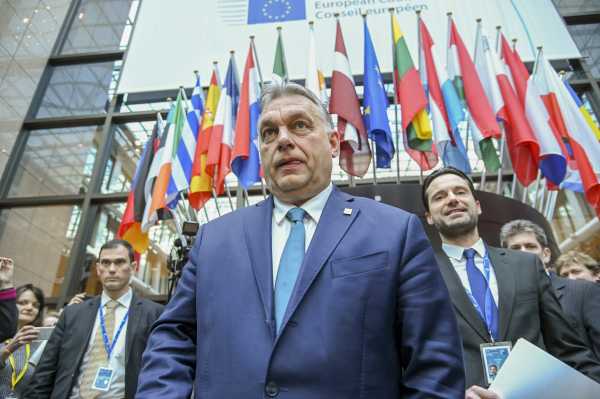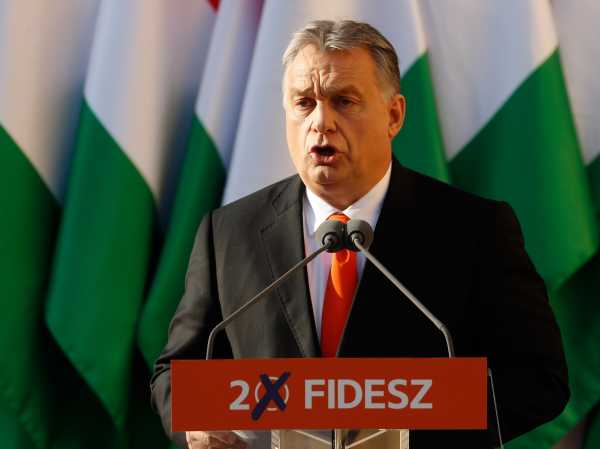
Two weeks ago, Hungary stunned the world. Using coronavirus as a pretext, Prime Minister Viktor Orbán pushed through a law that suspends elections and gives him the authority to rule by decree indefinitely — making him, at least temporarily, a dictator. A far-right firebrand exploiting a global catastrophe to seize near-unlimited control has obviously scary historical parallels; it’s the kind of power grab that got some citizens of Western democracies ruled by right-wing populists worrying about what their leaders might soon do under the circumstances.
In reality, Hungary has not been a democracy for years. But Orbán had cleverly maintained the veneer of a democracy — regular but deeply unfair elections, a formally free press that’s almost entirely controlled by the state, laws passed through a parliament where loyal members of his Fidesz Party control two-thirds of the seats — over what had become, in practice, a system where the opposition was permanently locked out of power while Orbán did what he pleased.
The new law, a so-called “coronavirus coup” enacted in the crisis atmosphere of a pandemic, strips off that veneer. It is an uncharacteristically crude measure, one that makes the more subtle reality of what’s happened to Hungarian democracy quite obvious. Yet even now, the full implications of what he’s been doing during the crisis are poorly understood.
In the two weeks since the law passed, Orbán has used the coronavirus response effort as a pretext to further weaken his political enemies. He has seized funding provided to opposing political parties for their campaigns and re-appropriated it in the name of stimulus. He has taken advantage of the loss in coronavirus advertising revenue to buy up one of the few remaining independent media outlets in Hungary.
The prime minister’s overt power grab is best thought of as a kind of clarifying moment: Rather than establishing a dictatorship anew, it exposes what Hungary had already become.
“Orbán didn’t need any empowerment, as he has a two-third majority in the parliament,” says Ákos Hadházy, a member of parliament from the opposition LMP faction. “The most important changes are not even about the law.”
There is a lesson to be learned here for the rest of the world. Orbán billed himself as one of the leaders of a new wave of right-wing populists, the “illiberal democracy” he was building in Hungary as a model for the rest of the Western world. He sees himself as a leading indicator, not a lagging one.
Hungary’s fate is a warning to the rest of the world. The coronavirus presents an opportunity for right-wing populists looking to solidify their hold on power and further undermine liberal democracy itself. The idea that there can be some populist “illiberal democracy” is a fiction — both in Hungary and in the United States.
Orbán’s power grab makes the subtext the text
The centerpiece of the new Hungarian law is fairly simple: It empowers Orbán to “suspend the enforcement of certain laws, depart from statutory regulations and implement additional extraordinary measures by decree,” as per a draft translation on the academic blog Hungarian Spectrum.
This means exactly what it sounds like it means: For the time being, Orbán is empowered to issue decrees that have the force of law. The law contains no binding constraints forcing the prime minister to issue decrees narrowly related to public health, nor does it ever expire.
According to the Hungarian constitution, any such emergency decrees should only last for a maximum of 15 days before they must be renewed by a majority in parliament. But Section 3 of the new law waives this requirement, giving automatic pre-approval to all of Orbán’s decrees. This means that, in practice, his dictates are in force indefinitely from the day he issues them.
In theory, the opposition parties in parliament could bring a case against the law to Hungary’s Constitutional Court. In practice, they’d be nearly certain to lose: A quantitative analysis by Hungarian researchers and human rights activists found that Orbán’s hand-picked justices on the court were overwhelmingly likely to rule in favor of his government on key issues.
“The Constitutional Court is an institution that has previously been packed with loyalists to the governing majority,” an Amnesty International report on Hungary’s courts from early April explains. “[It] has failed to resist direct or indirect political pressure in significant human rights related cases.”
The courts are also unlikely to intervene against the law’s other hair-raising provision: its provisions criminalizing free speech. If citizens “claim or spread a falsehood or claim or spread a distorted truth” that the government concludes is “obstructing or preventing” effective coronavirus response, they are committing a criminal offense that is “punishable by one to five years of prison.”
None of these terms have precise definitions in the law. It is entirely up to the government and its captive courts to determine what qualifies as a “distorted truth” that is in some way “obstructing” the Hungarian response to the coronavirus. Hungarian observers believe this law could be used to punish entirely accurate reporting and whistleblowing on the government’s manifest failures in responding to the coronavirus pandemic — including incredibly low testing rates and, in 2017, Orbán shutting down a dedicated task force of disease experts and epidemiologists.

“According to the bill, [individuals] will become punishable by law for publishing the ACTUAL FACT that they are crammed, against professional standards, in a shared quarantine with people who are likely to be infected for an examination — as long as this leads to an undermining of public confidence in the executors of such a measure,” Kristián Ungváry, a leading Hungarian historian, writes in the independent online outlet Index.
While there are some reports of individuals being arrested under these provisions, information on the provision’s use is still hazy. So far, journalists do not appear to have been targeted.
But the point of the law is not to arrest journalists. Rather, it is to force self-censorship — to make reporters and their sources so afraid of being jailed that they won’t report too critically on the government’s slow, inefficient response to the pandemic, or the problems created by its chronically underfunded health care system.
That’s why there have been a number of government-aligned media outlets calling for journalists to be investigated or arrested instead of being imprisoned outright. It’s why the Hungarian justice minister has made it clear that the law applies to journalists. And early reports in the international press suggest that it’s working — one Hungarian journalist told the Guardian that sources in the hospital system had stopped talking, citing the threat of imprisonment under the law.
“You’ll turn on the TV and you’ll see people calling for the arrests of reporters and editors,” Peter Erdelyi, a journalist at the Hungarian news outlet 444, told PRI. “I think that will have a chilling effect. Even if people don’t believe that they are going to get arrested, this will affect you.”
So long as these provisions are in power — the prime minister with unlimited and unchecked power, the press muzzled — it is impossible to deny that Hungary is anything but a one-man show.
“This is a very different order of magnitude than what we’ve seen before,” says Kim Lane Scheppele, an expert on Hungarian law at Princeton University. “It’s impossible to put a fig leaf over this being a dictatorship any longer.”
Hungary’s kayfabe democracy
The centerpiece of the government’s defense of the new law against charges like Scheppele’s is that the law is temporary. It will only last for as long as the coronavirus does; Hungary’s parliament, which is still considering legislation, can suspend it at any time.
“The parliament can lift the state of emergency — state of danger, as we call it — at any time,” Zoltán Kovács, a chief Orbán spokesman, writes in an official Q&A. “Furthermore, the state of danger applies specifically to the coronavirus epidemic. We all hope the epidemic will end soon, and with it so will the state of danger and these extraordinary measures.”
It is entirely possible, if not likely, that the state of emergency will formally end. Right now, the law helps the prime minister look strong in the face of the coronavirus situation — but it could eventually prove more trouble internationally than it’s worth domestically. Orbán often employs a tactic he’s described as “the dance of the peacock” — he does something incredibly provocative, then makes a show of retreating from it to quiet international criticism while more subtly retaining some of the underlying powers he grabbed in the first place.
In that sense, focusing too much on the indefinite formal authoritarianism could help Orbán get away with other abuses. It’s possible that Hungary’s parliament could end the state of emergency, formally take its power back, while still leaving some of the more subtle authoritarian power grabs Orbán has launched under this emergency in place — like defunding his political opponents and entrenching his control over the press.
To understand what’s happening here, you need to understand how power in Hungary actually works. Though Orbán’s Fidesz Party won less than 50 percent of the vote in Hungary’s 2018 election, it controls two-thirds of the seats in parliament thanks to extreme gerrymandering. That’s enough to amend the Hungarian constitution, meaning there are no real checks on the party’s power. Since Fidesz is entirely loyal to Orbán, he already has functionally unchecked power.
To maintain this level of control, Orbán and Fidesz employ a number of strategies to render national elections functionally non-competitive. One of the most devious ones involves taking near-total control of the media — using state regulatory powers to punish independent outlets, cutting off revenue from government advertising until they sell to the government itself or a private mogul loyal to Orbán. By 2017, according to a count by Budapest-based scholar Marius Dragomir, 90 percent of all media in Hungary was owned by either the state or a Fidesz ally.
There’s a term in professional wrestling — “kayfabe” — that describes the pantomime of truth in their events. While every match is staged, scripted in advance, the actors and producers work to portray them to their audience as “true.” Everyone knows it’s a stage performance with actors, more of a play than a sports competition, but no one admits it.
That’s what national elections in Hungary are like: functionally scripted performances that the people in charge insist are real. And during the coronavirus emergency, Orbán has worked to cement this form of social control in ways significantly more disturbing than even the country’s emergency law itself.

The most devious example of this relates to, of all things, stimulus funding. Like virtually every government around the world, the Hungarian government is proposing a stimulus bill during social distancing. The bill under proposal funds itself primarily by taking money away from Orbán’s political opponents.
Most egregiously, his government has taken away 50 percent of federal funding from all political parties to fund the coronavirus response. This might seem to affect all parties equally, but Fidesz has a variety of sources of campaign funding independent of state support. It’s the opposition parties that depend on government money. And the deck is getting even more stacked against them.
“While Fidesz, the governing party, has practically infinite resources, this will put a massive strain on opposition parties,” writes Hungarian journalist Szabolcs Panyi.
Last year, opposition parties won some impressive victories in local elections — seizing control of the municipal government in, among other places, the capital of Budapest (home to Hungary’s most anti-Orbán citizens). The stimulus proposal seizes control of a major source of funding for these cities and towns, a vehicle tax, and redirects it to funding the federal relief effort.
Not content to target Orbán’s political opponents, the Fidesz establishment is also exploiting the crisis in journalism ad revenue to consolidate its control over the press. At the end of March, Fidesz-aligned media magnate Miklós Vaszily purchased 50 percent of Indamedia — a company that controls advertising revenue for Index, one of the few remaining significant independent outlets in Hungary.
Index is insisting it will stay independent, but Vaszily has a scary track record. A former head of state-run media, he took control of the website Origo in 2014 and converted it into Fidesz propaganda. There’s real concern he’ll do the same for Index.
“Index will not close … pro-government media will probably overtake it,” Ágnes Urbán, of the Mérték Média Monitor watchdog in Hungary, told Reuters.
The emergency law is a show of force. But Orbán’s authoritarian rule has far deeper sources than one law. Its repeal will not restore Hungarian democracy — and, in fact, could end up masking the ways in which he’s exploiting the crisis to make Hungary’s national elections even more of a kayfabe performance than they already are.
“Orbán needed this law to show he is a strong leader and able to hand the crisis alone,” Hadházy, the opposition lawmaker, tells me. “It is much more frightening that the Fidesz and the government have completely switched to campaign mode. They don’t care about the epidemic — they started the next election campaign.”
The coronavirus crisis is an opportunity for global right-wing populism
What’s truly remarkable about Orbán is that, despite all of this, he still has defenders in the West.
National Review ran a piece defending Orbán against charges of dictatorship by John O’Sullivan, the head of the Danube Institute, a Budapest-based think tank that’s indirectly funded by the Hungarian government. The American Conservative’s Rod Dreher, who describes himself as “an admirer of many of the things Viktor Orbán has done,” literally embedded government propaganda in a piece concluding that the emergency law was “basically fine.”
Such Orbán fans admire the Hungarian strongman for his strident opposition to immigration and his profound cultural conservatism, causes on which he’s doubled down during the pandemic. For example, the Hungarian parliament is currently considering a bill that would legally fix an individual’s gender as the sex they were assigned at birth — erasing transgender people from existence.

Such an approach has made Orbán popular among various types of “post-liberals” in the West, conservative commentators and intellectuals who reject liberal ideas of equality and tolerance in favor of a religiously informed, politically empowered vision of politics. This view got a prominent airing the same week as Orbán’s power grab, when post-liberal Harvard professor Adrian Vermeule argued for an “illiberal legalism” based on “a candid willingness to ‘legislate morality’” in the pages of the Atlantic. The allusion to Orbán’s term for his own vision of politics, “illiberal democracy,” is unmistakable.
In a certain sense, then, Orbán’s coronavirus power grab has done us an enormous favor. It has exposed that post-liberalism, which typically claims to be a new and more authentic species of democracy, collapses into authoritarianism in practice. Actual existing illiberal political movements reject core commitments to the toleration of political dissent, an assertion in the confidence of one’s own moral vision that allows the stamping-out of everyone else’s.
Hungary is not the only country where right-leaning illiberal populists have exploited the situation to their political advantage. In Poland, a ruling party often compared to Orbán’s has refused to postpone a May election despite a ban on public campaigning — shutting down the opposition’s ability to compete with a government that controls the airwaves.
Here in the United States, President Trump purged government watchdogs that might draw attention to his abuse of stimulus funding and conduct general oversight of his administration. He has launched a full-scale PR attack on the press, refusing to answer legitimate questions at briefings.
He has used his official spokespeople and friendly media outlets to rewrite the history of his response, spinning a terribly slow failure as an example of decisive leadership. He has seemingly turned the distribution of medical supplies into a form of political patronage and blustered about how the president has “total authority” to respond to the virus.
The fantasy of some kind of illiberal democracy was always just that: a fig leaf for authoritarian political movements that wished to bend the state to their will, one that some credulous observers are willing to accept purely out of culture war spite. The rest of us should not be so naïve.
Support Vox’s explanatory journalism
Every day at Vox, we aim to answer your most important questions and provide you, and our audience around the world, with information that has the power to save lives. Our mission has never been more vital than it is in this moment: to empower you through understanding. Vox’s work is reaching more people than ever, but our distinctive brand of explanatory journalism takes resources — particularly during a pandemic and an economic downturn. Your financial contribution will not constitute a donation, but it will enable our staff to continue to offer free articles, videos, and podcasts at the quality and volume that this moment requires. Please consider making a contribution to Vox today.
Sourse: vox.com






